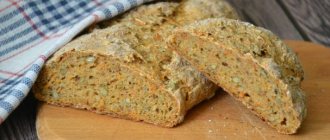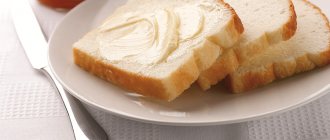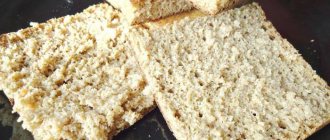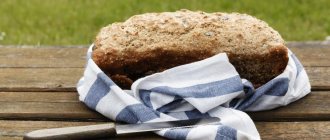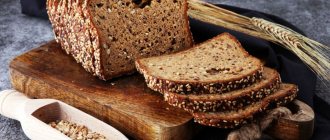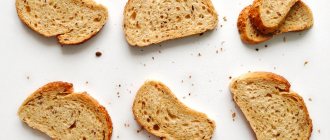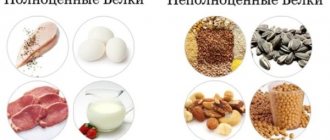Meat
All types of meat contain almost no carbohydrates. The only exception is parts such as the liver, which contains about 5% carbohydrates.
Beef (zero)
Beef is filling and rich in important elements such as iron and B12. There are dozens of ways to prepare it, from ribs to ground meat and cutlets.
Carbohydrates : zero
Lamb (zero)
Like beef, lamb contains a lot of nutrients, iron and B12. Because the animal is often grass-fed, the meat often contains an essential fatty acid called conjugated linoleic acid, or CLA (14).
Carbohydrates : zero
Chicken (zero)
Chicken is one of the most popular foods on earth. It contains many useful substances and is an excellent source of protein.
If you're on a low-carb diet, you may want to opt for fattier cuts like wings or thighs.
Carbohydrates : zero
Pork, including bacon (usually zero)
Pork is another delicious type of meat, and bacon is a favorite of many low-carb dieters.
Bacon, however, is a processed meat, so it hardly qualifies as a “health food.” However, on a low-carb diet it is quite acceptable to eat a moderate amount.
Most importantly, try to buy bacon from retailers you trust, make sure it doesn't contain artificial additives, and don't overcook the meat when cooking.
Carbohydrates : zero. But read the label carefully and avoid smoked or sugar-cured bacon.
Jerky (usually zero)
Dried meat is meat that has been cut into thin pieces and dried. And, as long as there is no added sugar or artificial additives, it can be a great addition to a low-carb diet.
However, we should not forget that what is sold in stores is often highly processed and is no longer healthy food. Therefore, it is best to make such meat yourself.
Carbohydrates : depends on the type. If it's just meat with seasoning, then approximately zero.
Kefir-almond pie
Carbohydrates per serving: 6.9 g
Ingredients:
- 1 stack kefir
- 2 stacks almond flour
- 1 stack brown sugar
- 2 tsp. baking powder
- 2–3 tsp. ground cinnamon
- 1/3 tsp. baking soda
- 1/4 tsp. nutmeg
- 200 g butter
- 2 eggs
- 1/4 cup nuts
Preparation:
- Mix 1 cup. almond flour, half sugar, half cinnamon, a pinch of salt. Add finely chopped chilled butter (100 g) to the dry ingredients. Using a knife, chop everything together until the mixture resembles coarse crumbs. Place in the refrigerator for a while.
- Separately mix 1 cup. almond flour, 0.5 cup. sugar, spices, baking powder and soda. Then add the remaining melted butter, whipped with kefir and eggs. Knead the dough.
- Place the dough into a baking pan. Sprinkle the prepared crumbs generously on top. Place in an oven preheated to 180 degrees for 45–60 minutes.
Fish and seafood
Fish and other seafood are generally very nutritious and healthy.
They are especially high in vitamin B12, iodine and omega-3 unsaturated fatty acids, which are elements that many people lack in their diets.
Like meat, almost all fish and seafood contain almost no carbohydrates.
Salmon (zero)
Salmon is one of the most popular fish among health-conscious people, and for good reason.
It is an oily fish, which means it contains significant reserves of heart-healthy fats, in this case, omega-3 unsaturated fatty acids.
Salmon is also rich in vitamin B12, D3 and iodine.
Carbohydrates : zero.
Trout (zero)
Carbohydrates : zero.
Like salmon, trout is a type of fatty fish rich in omega-3 unsaturated fatty acids and other important elements.
Sardine (zero)
Sardine is a fatty fish that is usually eaten almost entirely, bones and all.
Sardine is one of the most nutrient-dense fish on the planet, and contains almost everything the human body needs.
Carbohydrates: zero.
Shellfish (4-5% carbohydrates)
Unfortunately, shellfish find their way into our daily diet much less often than they deserve. However, they are on a par with the healthiest products in the world, and in terms of nutritional richness they can compete with meat from internal organs.
Shellfish typically contain small amounts of carbohydrates.
Carbohydrates : 4-5 grams of carbohydrates per 100 grams of shellfish.
Pumpkin pie
Carbohydrates per serving: 12 g
Ingredients:
- 500 g prepared puff pastry
- 400 g pumpkin puree
- 1/2 tsp. stevia (concentrated powder)
- 1 tsp. cinnamon
- 1/2 tsp. ground ginger
- 1/4 tsp. nutmeg
- 3 egg yolks
- 1 large egg
- 2/3 stack. cream
Preparation:
- Thaw the puff pastry, roll it out and place it in a baking dish. Make the edges of the dough into the “sides” of the future pie.
- Mix pumpkin puree, stevia, cinnamon, ginger and nutmeg.
- Beat the egg with the yolks. Gradually, without stopping whisking, add cream to the mixture. Combine it all with pumpkin puree.
- Pour pumpkin filling into prepared pan with batter. You can cover the edges with aluminum foil to prevent burning.
- Bake at 180–190 degrees for 30–40 minutes. Cool the finished dessert in the mold without removing it. Then store in the refrigerator.
Vegetables
Most vegetables contain almost no carbohydrates, especially leafy greens and cruciferous vegetables, since almost all of their carbohydrates are found in fiber.
On the other hand, starchy root vegetables such as potatoes and sweet potatoes are rich in carbohydrates.
Broccoli (7%)
Broccoli is a delicious cruciferous vegetable that can be cooked or eaten raw. It's high in vitamin C, vitamin K, fiber, and contains powerful plant compounds that may help prevent cancer.
Carbohydrates : 6 grams per cup or 7 grams per 100 grams.
Tomatoes (4%)
Technically, tomatoes are berries, but they are classified as vegetables. They have a lot of vitamin C and potassium.
Carbohydrates: 7 grams in a large tomato or 4 grams per 100 grams.
Onion (9%)
Onions are one of the tastiest vegetables on earth and add a vibrant flavor to dishes. It contains a lot of fiber, antioxidants and various anti-inflammatory components.
Carbohydrates: 11 grams per cup or 9 grams per 100 grams.
Brussels sprouts (7%)
Brussels sprouts are an incredibly nutritious vegetable, a relative of broccoli and regular cabbage. Rich in vitamin C, K and many other beneficial elements.
Carbohydrates: 6 grams per half cup or 7 grams per 100 grams.
Cauliflower (5%)
Cauliflower is a tasty and versatile vegetable that can be used to prepare varied and interesting dishes. It is rich in vitamins C, K and folate.
Carbohydrates : 5 grams per cup and 5 grams per 100 grams.
Kale (10%)
Kale or kale is very popular among health-conscious people. It is rich in fiber, vitamins C, K and carotene antioxidants. Among other things, kale in general has incredible health benefits.
Carbohydrates: 7 grams per cup or 10 grams per 100 grams.
Eggplant (6%)
Eggplant is another fruit that is often mistaken for a vegetable. It is rich in fiber and very varied in consumption.
Carbohydrates: 5 grams per cup or 6 grams per 100 grams.
Cucumber (4%)
Cucumber is a common vegetable with a mild flavor. Consists mainly of water with a small amount of vitamin K. [goes well with lard - approx. transl.]
Carbohydrates: 2 grams per half cup or 4 grams per 100 grams.
Bell pepper (6%)
Bell pepper is a well-known vegetable with a distinct, pleasant taste. It is high in fiber, vitamin C and carotene antioxidants.
Carbohydrates : 9 grams per cup or 6 grams per 100 grams.
Asparagus (2%)
Asparagus is a surprisingly tasty spring vegetable. It's loaded with fiber, vitamin C, folate, vitamin K, and carotene antioxidants. It also has a lot of protein compared to other vegetables.
Carbohydrates: 3 grams per cup or 2 grams per 100 grams.
Green beans (7%)
Green beans are technically a member of the legume family, but they are cooked and consumed as a vegetable.
Each bite contains a huge amount of nutrients, as well as fiber, protein, vitamin C, K, magnesium and potassium.
Carbohydrates: 8 grams per cup or 7 grams per 100 grams.
Mushrooms (3%)
Mushrooms, generally speaking, are not plants, but for simplicity, edible mushrooms are classified as vegetables. They contain significant amounts of potassium and some B vitamins.
Carbohydrates : 3 grams per cup and 3 grams per 100 grams (ceps).
Carrot cake with butter cream
Carbohydrates per serving: 5 g
Ingredients:
- 1/2 cup brown sugar
- 7 tbsp. l. softened butter
- 4 eggs
- 2 tbsp. l. almond milk (or regular)
- 1 tsp. vanilla
- 1.5 stack. flour
- 2 tbsp. l. coconut flakes
- 1 tbsp. l. baking powder
- 1.5 tsp. ground cinnamon
- 1–2 carrots
- 100 g cream cheese
- 50 ml cream
Preparation:
- Whisk 5 tbsp. l. softened butter with sugar, add eggs, milk and vanilla.
- Then add flour, coconut, baking powder and cinnamon. Grate the carrots on a fine grater and stir into the resulting dough. Stir until smooth.
- Place the dough in a baking pan lined with parchment. Bake in an oven preheated to 180 degrees for 18–25 minutes. Let the dough cool completely.
- For cream cheese, mix 2 tbsp. l. softened butter and cream cheese. Add vanilla and heavy cream and beat well. Spread the cream onto the dough.
Fruits and berries
Although the generally accepted opinion about fruit is that it is a healthy food, the attitude towards it among supporters of a low-carb diet is quite contradictory.
And all because fruits sometimes contain quite a lot of carbohydrates compared to vegetables.
Depending on what threshold you have set for yourself, you may need to limit the amount of fruit to one or two per day.
This, however, does not apply to fatty fruits such as avocados or olives.
Low-sugar berries, such as strawberries, are also good for you.
Avocado (8.5%)
Avocado is a unique fruit. Instead of carbohydrates, it is loaded to the brim with healthy fats.
Avocados are high in fiber, potassium, and all sorts of other nutrients.
Carbohydrates: 13 grams per cup or 8.5 grams per 100 grams.
Don't forget that the carbohydrates mentioned (about 78%) are contained mainly in fiber, so there are practically no digestible (“net”) carbohydrates in it.
Olives (6%)
Olives are another delicious fruit that is high in fat. It contains a lot of iron, copper and vitamin E.
Carbohydrates: 2 grams per ounce or 6 grams per 100 grams.
Strawberry (8%)
Strawberries are the lowest carb, highest nutrient fruit you can find on your table. It is rich in vitamin C, manganese and various antioxidants.
Carbohydrates: 11 grams per cup or 8 grams per 100 grams.
Grapefruit (11%)
Grapefruits are citrus fruits related to oranges. They are very rich in vitamin C and carotene antioxidants.
Carbohydrates: 13 grams in half a grapefruit or 11 grams per 100 grams.
Apricot (11%)
Apricot is an incredibly delicious fruit. Each apricot contains some carbohydrates, but also a ton of vitamin C and potassium.
Carbohydrates: 8 grams in two apricots or 11 grams per 100 grams.
Apple pie
Carbohydrates per serving: 8 g
Ingredients:
- 500 g puff pastry dough
- 500–600 g apples
- 90 g stevia
- 1 tsp. cinnamon
- 1 tsp. lemon zest and lemon juice
- 1 egg
- 1 tbsp. l. starch
- 1 chip salt
Preparation:
- Peel the apples and cut into cubes. Pour boiling water over them and boil for 3-5 minutes. Then drain the water and add stevia, cinnamon, lemon and zest, as well as starch and salt.
- Divide the dough into two parts. Roll out one of them and place it on the bottom of a baking dish, greased with oil, form the sides.
- Place the filling in the pan on top of the dough. Cover the top of the pie with the other half of the dough, rolled out thinly. Pinch the edges of the bottom and top layers of dough so that the apples are inside.
- Brush the surface with beaten egg and place the pie in the preheated oven. Bake for 15 minutes at 220°C, then reduce the temperature to 180°C and bake for a further 30 minutes until the top of the cake is golden brown.
- Let the pie cool before serving. The filling turns out very juicy.
Nuts and seeds
Nuts and seeds are very popular in low-carb diets. They are usually low in carbohydrates, but high in fat, fiber, protein and various microelements.
Nuts are typically found in snack foods, but seeds are more often used to add texture to salads or other dishes.
Nut and seed flours (such as almond, coconut or flax seed flour) are also used to make low-carb breads and other baked goods.
Almonds (22%)
Almonds are a wonderful treat. It's high in fiber, vitamin E, and one of the world's best sources of magnesium, a mineral that most people are deficient in one way or another.
In addition, almonds cause quick satiety, which, according to some studies, helps with weight loss.
Carbohydrates: 11 grams per ounce or 22 grams per 100 grams.
Walnut (14%)
Walnut is another delicious type of nut. It is especially high in omega-3 polyunsaturated fatty acids, as well as a variety of other nutrients.
Carbohydrates: 4 grams per ounce or 14 grams per 100 grams.
Peanuts (16%)
Peanuts are technically a member of the legume family, but everyone tends to think of them as nuts. It's loaded with fiber, magnesium, vitamin E, and many other important vitamins and minerals.
Carbohydrates: 5 grams per ounce or 16 grams per 100 grams.
Chia seeds (44%)
Chia seeds are gaining popularity among healthy eating enthusiasts. They are loaded to the brim with a variety of essential nutrients and are a great addition to many low-carb recipes.
This is one of the best known sources of dietary fiber that you can find on the shelves.
Carbohydrates: 12 grams per ounce or 44 grams per 100 grams.
Don't forget that about 86% of chia seeds' carbohydrates are found in fiber, so they contain almost no digestible ("net") carbohydrates.
No-carb candies
Atkins bars
An Atkins bar is suitable for those who are losing weight on any carbohydrate-free diet or who are involved in strength sports. The increased concentration of protein makes it possible to consume the product as a snack, and a large assortment of fillings significantly expands the consumer audience. Taking into account your preferences, you can choose a bar with the flavors of caramel, nuts, nougat, coconut, etc.
Marshmallow
Those who prefer lightness in dessert will set their eyes on marshmallows. A characteristic feature of such marshmallow-like, carbohydrate-free sweets is that their composition is practically no different from other sweets during a diet. They replace sugar with maltitol and reduce the starch content.
A low-carbohydrate diet is chosen due to various factors. It is extremely important for those suffering from diabetes, those who want to lose weight, and athletes. A characteristic feature of such a diet will be a complete rejection of fast carbohydrates and a reduction in the consumption of complex ones. Any dietary food is a psychological burden due to the forced restriction of habitual food products. A significant dependence on sweets in some situations is the main provoking factor for a breakdown. Sweets without carbohydrates help add variety to your diet and also reduce the effect of sugar on the body.
They are products that contain the least amount of carbohydrates. In this regard, they are available for consumption during the diet. The products in question do not contain sugar (the most harmful carbohydrate), fructose or glucose. To give it a sweet taste, various kinds of substitutes are used. Such sweets have a low glycemic index and are suitable for people with diabetes.
The main advantages of carbohydrate-free sweets are:
- the ability to stay slim;
- no harmful effects on tooth enamel;
- good taste, no different from “real” sweets;
- low glycemic index.
Dairy
If you are not lactose intolerant, then full-fat, low-carb dairy products are for you. The main thing is to pay attention to the label and avoid anything with added sugar.
Cheese (1.3%)
Cheese is one of the tastiest low-carb foods, and you can eat it raw or create a variety of interesting foods with it. It goes especially well with meat, and also as part of a burger (without a bun, of course).
Cheese is also highly nutritious. A piece of cheese contains as many nutrients as a whole glass.
Carbohydrates: 0.4 grams per slice or 1.3 grams per 100 grams (cheddar).
Heavy cream (3%)
Heavy cream is very low in carbohydrates and protein, but high in milk fat. Many low-carb dieters add them to coffee or other dishes. A rosette of berries with whipped cream is a delicious low carb dessert.
Carbohydrates: 1 gram per ounce or 3 grams per 100 grams.
Full fat yogurt (5%)
Full-fat yogurt is an extremely healthy food. Contains the same substances as whole milk, but contains live cultures that provide extremely beneficial probiotic bacteria.
Carbohydrates: 11 grams per 8-ounce container or 5 grams per 100 grams.
Greek yogurt (4%)
Greek yogurt, also called filtered yogurt, is very thick compared to regular yogurt. It is rich in nutrients, especially protein.
Carbohydrates: 6 grams per package or 4 grams per 100 grams.
Low carb desserts
It is possible to expand your diet for those on a diet by eating low-carb desserts. The most common recipes are:
Chocolate mousse
To prepare it you will need:
- 125 g low-fat cottage cheese,
- 3 tbsp. l. water,
- 6 proteins,
- 125 g chocolate,
- salt and 1 tsp. coffee.
Mix water, broken chocolate and coffee in a small container. The mass is melted in a water bath. Mix with cottage cheese until a homogeneous mixture is formed. Beat the whites with salt until a thick mass appears. Combine with the resulting chocolate mixture, pour into glasses and leave in the refrigerator for at least 2 hours.
The life of people suffering from diabetes is full of restrictions when it comes to nutrition, because it is necessary to maintain blood glucose levels within acceptable limits.
You have to give up the habit of eating sweets. But even diabetics can treat themselves to a variety of delicious and healthy desserts from time to time.
Fats and oils
There are many healthy fats and oils that are acceptable on a natural low-carb diet.
Most importantly, avoid refined vegetable oils such as soybean or corn because they are very harmful in large quantities.
Oil (zero)
Butter was once demonized for being rich in fat, but now it is making a comeback on our tables. If possible, choose grass-fed butter because it contains more nutrients.
Carbohydrates: zero.
Extra virgin olive oil (zero)
Extra virgin olive oil is one of the healthiest things you can add to your diet. In addition, this is the product on which the Mediterranean diet is based.
It's loaded with powerful antioxidants and anti-inflammatory elements, and it's also incredibly beneficial for your cardiovascular system.
Carbohydrates: zero.
Coconut oil (zero)
Coconut oil contains healthy fats and medium chain fatty acids, which have extremely beneficial effects on metabolism. Studies show that it helps reduce appetite, helps burn fat and reduce abdominal fat deposits.
Carbohydrates: zero.
Keto Napoleon
A carbohydrate-free Napoleon cake can be prepared at home using a basic set of products allowed on the keto diet.
Ingredients
For the cakes:
- 100 g almond flour;
- 50 g coconut flour;
- 50 g coconut oil;
- 20 g chia seeds;
- 1 chicken egg;
- 40 g applesauce (preferably for children).
For cream:
- 250 ml coconut cream;
- 250 g honey or gluten-free topping;
- zest of one lemon;
- 100 ml lemon juice;
- 2 eggs;
- 2 gelatin plates.
Beverages
Most sugar-free drinks are suitable for a low-carb diet.
Keep in mind that fruit juices are very high in sugar and carbohydrates and should definitely be avoided.
Water
Water should be your main drink, regardless of what the rest of your diet is based on.
Carbohydrates: zero.
Coffee
Despite the fact that at some point there was a false accusation about coffee, in fact the drink is very healthy.
It's the best source of antioxidants in the diet, and studies show that coffee drinkers live longer and are at lower risk of serious diseases such as type 2 diabetes and Parkinson's and Alzheimer's diseases.
Most importantly, don't add anything unhealthy to your coffee. Black coffee is best, but coffee with milk or cream is also okay.
Carbohydrates : zero
Tea
Tea, especially green tea, has been extensively studied and has been confirmed to have extremely positive health effects. It also promotes fat burning.
Carbohydrates: zero.
Sparkling water
Carbonated water is just water with carbon dioxide added. So as long as there is no sugar in it, it is completely acceptable. Read the label carefully to make sure no sugar has slipped inside.
Carbohydrates: zero.
Dark chocolate
It may come as a surprise to some, but dark chocolate is actually the perfect low-carb treat.
Make sure it is at least 70-85% cocoa, this will mean there is almost no sugar in it.
Dark chocolate has many health benefits, such as improving brain function and lowering blood pressure. Research also shows that dark chocolate lovers have a much lower risk of heart disease.
You can learn about the health benefits of dark chocolate from this article.
Carbohydrates: 13 grams per 1-ounce bar or 46 grams per 100 grams. Carbohydrate content varies depending on the type of chocolate, so read the label carefully.
Don't forget that about 25% of dark chocolate's carbohydrates come from fiber, so its edible carbohydrate count is even lower.
Herbs, spices and seasonings
There are an endless number of wonderful herbs, spices and seasonings recommended for consumption. Most of them do not contain carbohydrates, but will make your dishes healthy, tasty and flavorful.
Examples of such seasonings include salt, pepper, garlic, ginger, cinnamon, mustard and oregano. In this article you will find 10 wonderful herbs and spices that are also incredibly healthy.
Sweets, carbohydrates and diabetes
Sugar and carbohydrates consumed with food supply glucose into the blood, which penetrates the cells and is converted into energy necessary for the body's functioning.
The hormone insulin secreted by the pancreas controls the entry of glucose into cells. As a result of an endocrine metabolic disorder, the hormone ceases to cope with its function, and the glucose concentration increases above the permissible level.
In type 1 diabetes, insulin is practically not produced by the pancreas, and diabetics are forced to make up for its deficiency with insulin injections. In type 2 diabetes, enough insulin is produced, but the cells stop responding to it and blood sugar levels rise.
It turns out that the less carbohydrates and sugar enter the body, the slower the accumulation of glucose in the blood.
Based on this, special dietary nutrition is developed for diabetics, the essence of which is to comply with the following rules:
- eliminate sugar and sweets from your diet;
- use natural sweeteners instead of sugar;
- The menu should be based on protein and low-carbohydrate dishes;
- give up sweet fruits, starchy vegetables and foods containing fast carbohydrates;
- Low-calorie food is recommended;
- eat foods with a low glycemic index;
- for desserts and baked goods, use oatmeal, whole grain, rye or buckwheat flour and low-fat dairy and fermented milk products;
- limit the use of fats.
Even safe diabetic desserts and pastries should appear on the table no more than two or three times a week.

